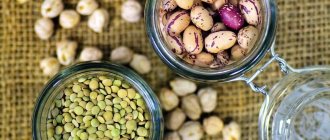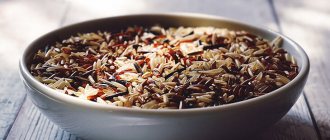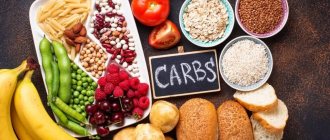What are fast carbohydrates and how do they differ from slow carbohydrates? Why are they important?
Carbohydrates (saccharides) are the main source of energy for the body (1 g of carbohydrates gives 4 kcal) - it breaks them down and converts them into glucose, which nourishes tissue cells. Carbohydrates are essentially macronutrients and are made up of fiber, starch and sugar. All of these are essential nutrients for the body. Fiber and starches are slow carbohydrates (complex), and sugars are fast (simple).
Fast carbohydrates are found in sweets, baked goods, and soda. Fast carbohydrates consist of simple sugars (monosaccharides, disaccharides) - the body breaks them down instantly and immediately receives the energy it needs. At the same time, the blood sugar level rises sharply, but falls just as quickly - that is, the energy is only enough for a short time. The fact is that in response to a jump in blood glucose, the pancreas produces insulin, a hormone that normalizes glucose levels. But insulin does not work for long, and after 30-40 minutes the feeling of fullness is replaced by hunger.
Slow carbohydrates are found in whole grain cereals, legumes, and vegetables - they contain more nutrients (vitamins, minerals, antioxidants) than products with simple carbohydrates. Complex carbohydrates have a complex structure and consist of polysaccharides - complex molecular chains that the body breaks down into simpler ones - and this takes time (about 2 hours). While the body is busy with this process, you feel full. At the same time, energy is supplied in doses, but steadily - without sudden surges in sugar, changes in vigor/fatigue.
It is easy to distinguish fast carbohydrates from slow ones - the former consist of one (monosaccharides) or two molecules (disaccharides) and have a high GI (glycemic index) - they recharge quickly, the effect is short-term. The latter contain more than two molecules (polysaccharides) and have a high GI - they work slowly, but for a long time.
What about carbohydrates?
A carbohydrate is made up of carbon and water. Thanks to them, a person receives the energy necessary to maintain the vitality of the body. When 1g is split, 17.6 kJ of energy is released.
With insufficient carbohydrate intake, the breakdown of proteins and fats begins, which leads to the accumulation of toxins. Also sugar:
- Ensures the functioning of the brain, kidney tubules, and eyeball.
- They participate in the synthesis of complex proteins and components of the immune system, as well as other substances necessary for the functioning of the body.
- Ensure normal functioning of the heart, nervous system, muscle tissue, liver and digestive system.
- Regulates the processes of protein and fat metabolism.
Most foods contain carbohydrates. Eggs, meat, fish and seafood may contain a minimum amount. Dairy products contain lactose.
There are four types of substances:
- Monosaccharides. They are not able to break down into simpler ones. These include glucose and fructose.
- Disaccharides. These are complex compounds of two monosaccharide residues. For example, lactose, sucrose.
- Oligosaccharides. They contain residues of several monosaccharides (no more than 10). For example, beet raffinose.
- Polysaccharides. The most complex connections. They are formed from a large number of glucose residues. They are divided into digestible (starch) and non-digestible (fiber).
What foods contain carbohydrates:
- Sugar, honey
- Drinks with added sugar: juices, compote, tea, coffee.
- Alcoholic drinks.
- Flour dishes: muffins, cakes, bread, buns.
- Pasta.
- Fruits, herbs and vegetables.
- All types of cereals.
- Nuts, seeds.
- Legumes: beans, peas, lentils.
- Dairy products: milk, kefir, fermented baked milk, cottage cheese.
Thus, the list of carbohydrates includes a fairly large number of food products, but not all of them are equally valuable.
What does the glycemic index (GI) have to do with it?
Dividing carbohydrates into simple and complex is not entirely correct. There is also a glycemic index (GI) - an indicator of how quickly a product is converted into glucose on a scale from 0 to 100. If carbohydrates are absorbed quickly, then the GI will be high, if slowly, then low. That is, the higher this indicator, the faster the blood sugar level rises, and vice versa. Where did these numbers come from? The researchers measured blood sugar levels after eating a certain food on an empty stomach (immediately after waking up), recorded these levels and divided them into three groups:
- up to 55 – low GI;
- from 55 to 69 – average GI;
- from 70 and above – high GI.
But: you should not focus only on GI; it is also important to take into account the glycemic load (GL) - an indicator of how many carbohydrates a product contains. The GN value can be low - up to 10, medium - 10-19, high - 20 and above.
For example, watermelon has a high GI of 76, but the GL is only 7. This means that blood sugar will not increase much, because carbohydrates make up only 5 g of volume, the rest is mostly water. But even here there are some nuances - GI and GN do not take into account the variety and ripeness of the product, changes after its preparation, or the combination of products in the dish. It is best to focus not on these indicators, but on the quality of the product. The GI of the same potato is very high, but if you cook it correctly (without oil, fatty milk), then there will be no harm from it.
What to eat to lose weight - more about proper carbohydrate consumption
See who needs how much and what kind of carbohydrates. In fact, you only need very few of them.
| Target | Norm of carbohydrates per day | Composition of carbohydrates | Recommendations |
| Lose weight | 20-40 g | slow | Consume carbohydrates in the first half of the day, after lunch - only proteins and fats |
| Maintain normal body weight | 50-60 g | slow - 80%, fast - 20% | Consume carbohydrates no later than 16.00 |
| To gain weight | 100-200 g | 50 to 50 | You can leave complex carbohydrates for the evening |
| For those who exercise intensively | 55% to 70% of daily calorie needs | 50 to 50 | It is better to consume slow carbohydrates about an hour before training, and fast carbohydrates 30 minutes after training. |
Why do fast carbohydrates cause you to gain weight?
The fact that simple carbohydrates work faster than their “healthy” counterparts is understandable. Why do people get fat because of them? Because they break down instantly - the body simply does not have time to spend them. As long as the body carries glucose through the blood, you feel full. But as soon as blood glucose levels rise above 100 mg/dL, insulin pushes glucose into fat cells. When insulin does its job, you want to eat again.
In theory, this is what happens: fast carbohydrate – a jump in sugar and insulin – hunger and overeating. But in practice, a person rarely consumes pure carbohydrates - usually the product also contains a lot of fat. For example, 100 g of chocolate contains approximately 50 g of carbohydrates and 34 g of fat - and they contain twice as many calories as carbohydrates. The vicious circle can be broken if you limit portions - eat, for example, not a bar of chocolate, but only a slice. But ideally, replace it with fruit - the same apple contains only 10 g of carbohydrates and 0.4 g of fat.
Myths about carbohydrates
Honey is a more dietary product than sugar
In fact, honey contains a lot of minerals and enzymes, and in this respect it is actually healthier than refined sugar. However, honey cannot be called a more dietary product than regular sugar, because it contains the same amount of “sugar” calories. In addition, honey is destroyed by heat treatment, so honey cookies are just cookies with sugar.
Fructose products are healthy
The myth about the benefits of fructose has spread because insulin is not involved in the breakdown of fructose. However, more than 50% of fructose is converted into glucose, and you remember that insulin is needed to utilize it, therefore the “excess” will be stored as fat. In addition, fructose, although to a lesser extent than glucose, affects the production of insulin, it promotes the deposition of fat in the liver, and abuse of fructose can lead to fatty liver.
Sugar is only found in sweets and baked goods
In fact, sugar is found in almost all foods. And starch is added to many finished products (sausages, yoghurts with “additives,” mayonnaise, which we are not inclined to classify as carbohydrates). By drinking a glass of sweet soda, you eat 5 teaspoons of sugar. So you should approach a variety of products very carefully, evaluating them by carbohydrates.
The importance of carbohydrates in nutrition. Why you can’t completely exclude them and rely on diets
A little bit of everything is good – and here’s why:
1. Slow carbohydrates are a source of fiber and starch - they have a lot of energy value for the body. The most useful type of carbohydrates is fiber - it is not stored in excess fat and even reduces the risk of obesity, controls blood sugar levels and helps the gastrointestinal tract. Starch is also needed in moderation - it feeds beneficial intestinal bacteria, increases insulin sensitivity and helps absorb nutrients. Long carbohydrates in the diet should be at least 50% of the total calories.
2. You can’t completely exclude simple carbohydrates - in moderation they won’t do any harm. Sugar is a source of energy for the brain - it consumes up to 30-40% of glucose from the blood. When you need to quickly replenish glycogen reserves, for example, after a workout, fast carbohydrates also help out. The fact is that during intense training, adrenaline suppresses the work of insulin - and it is responsible for the restoration and growth of muscle mass.
3. You shouldn’t trust diets either - giving up complex and simple carbohydrates does not guarantee weight loss - fats and proteins also affect blood sugar and insulin levels. On a low-carb and keto diet, for example, the first thing you lose is not extra pounds, but water. The fact is that carbohydrates retain water, and instead of losing weight, you will get dehydration and a bunch of other “side effects” (deficiency of vitamins and minerals, nausea, lethargy, sleep problems, headaches). You cannot stay on such diets for a long time, and not everyone can limit themselves to carbohydrates for a long time - without the main source of energy, the body begins to break down fats, and this is not easy. Plus, low-carb diets, like any other, have contraindications.
Carbohydrates and training
When considering fast carbohydrates as part of a nutrition plan, the main thing to understand is that taking a large amount of fast carbohydrates for those who do not exercise can lead to excess fat gain.
As for athletes, there are several reservations for them:
- If you consume carbohydrates shortly before the start of the training complex, they will not cause any harm, since all the energy will be spent on motor processes.
- Carbohydrates cause hypoxia, which leads to rapid filling and pumping.
- Fast carbohydrates practically do not load the gastrointestinal tract, which allows you to consume them shortly before the start of a workout.
And most importantly: fast carbohydrates perfectly close the carbohydrate window. Also, fast carbohydrates perfectly “leave holes” in cells, which helps accelerate the absorption into the blood of such important amino acids from proteins as taurine, etc., as well as creatine phosphate, which otherwise simply is not absorbed by our body (source - American Journal of Clinical Nutrition).
How many carbohydrates do men and women need per day?
The daily intake of carbohydrates depends on gender, age, weight, lifestyle and goals:
Women:
- lose weight – 50-55 kg (110 g), 60-65 kg (140 g), 70-75 kg (160 g), 80-85 kg (170 g);
- maintain weight – 50-55 kg (140 g), 60-65 kg (160 g), 70-75 kg (190 g), 80-85 kg (210 g);
- gain weight - 50-55 kg (190 g), 60-65 kg (240 g), 70-75 kg (250 g), 80-85 kg (260 g).
Men:
- lose weight – 50-55 kg (165 g), 60-65 kg (170 g), 70-75 kg (175 g), 80-85 kg (185 g);
- maintain weight – 50-55 kg (220 g), 60-65 kg (235 g), 70-75 kg (245 g), 80-85 kg (265 g);
- gain weight - 50-55 kg (280 g), 60-65 kg (295 g), 70-75 kg (310 g), 80-85 kg (320 g).
The percentage of carbohydrates in your daily caloric intake depends on your goals:
- less than 10% of total calories (reducing carbohydrates is usually used for medicinal purposes, such as for diabetics);
- 10-15% of the total calories (during weight loss for a short period of time, you can slightly limit carbohydrates, especially fast ones);
- 15-30% of total calories (suitable for those maintaining weight);
- more than 30% of total calories (athletes and those who want to gain muscle mass can increase the amount of carbohydrates).
Simple carbohydrates - food list
Fruits and berries: banana, kiwi, lychee, melon, pineapple, watermelon, dates, mango, persimmon.
Vegetables: potatoes, sweet potatoes, carrots, green peas.
Cereals: breakfast cereals, instant cereals, millet, white rice.
Dairy products: rice milk, ice cream, yogurt with fruit.
Sweets and snacks: rice cakes, marmalade, crackers, chips, chocolate, cakes, white bread, chocolate bars, cookies, honey, jam, soda.
For convenience, here is a table of foods with fast carbohydrates:
| Product | Glycemic index |
| Dates | 145 |
| Honey | 89 |
| Watermelon | 76 |
| Chips | 74 |
| Ice cream | 70 |
| Milk chocolate | 70 |
| A pineapple | 67 |
| Melon | 65 |
| Potato | 65 |
| White rice | 64 |
| Banana | 60 |
| Sweet potato | 55 |
Complex carbohydrates - food list
Fruits and berries: apple, blackberry, blueberry, cherry, grapefruit, orange, prunes, pears, peaches, dried apricots, plums, pears, strawberries.
Vegetables: asparagus, spinach, lettuce, radishes, broccoli, celery, cabbage, Brussels sprouts and cauliflower, eggplant, cucumbers, onions, turnips, artichokes, beans, lentils, cucumbers, radishes, carrots.
Cereals: barley, oatmeal, buckwheat, oat bran, brown rice, wheat germ, millet, cornmeal, wild rice.
Dairy products: low-fat yogurt, skim milk.
Seeds and nuts: almonds, peanuts, walnuts, cashews, sesame seeds, flaxseeds, sunflower seeds.
For convenience, here is a table of foods with slow carbohydrates:
| Product | Glycemic index |
| Buckwheat | 50 |
| Brown rice | 45 |
| Pear | 35 |
| Apple | 35 |
| Blackberry | 25 |
| Blueberry | 25 |
| Cherry | 22 |
| Beans | 22 |
| Low-fat yogurt | 19 |
| Asparagus | 15 |
| Spinach | 15 |
| Almond | 10 |
Which carbohydrates are needed for weight gain and which for weight loss? How to use them correctly
For sports purposes, both types of carbohydrates are important - each of them has its own role and benefits (portion sizes, calorie content and product quality also need to be taken into account):
Gaining muscle mass:
- fast carbohydrates - consume half an hour before and after training. In the first case, you will spend them faster than they have time to be deposited in fat, in the second, they will go straight to replenish glycogen reserves in the muscles (no need to worry about excess weight);
- slow carbohydrates – consume 1-2 hours before and after training. In the first case, the energy will last until the end of the session, in the second, the muscles will also recover and grow, but more slowly.
Weight loss:
- fast carbohydrates - you shouldn’t give them up completely, especially when losing weight - this can lead to breakdowns;
- Slow carbohydrates – save you from overeating and are not stored in reserve. While they are digesting, you feel full.
The meaning of fast carbohydrates
Let's discuss the question that interests us most: fast carbohydrates - what is it for an athlete. Despite the fact that many are skeptical about eating sweets, fast carbohydrates have a place in professional sports. However, you need to clearly understand how simple carbohydrates differ from complex ones, and how to use them correctly in sports.
Simple carbohydrates are great for filling the glycogen window that occurs immediately after finishing a workout.
At the same time, fast carbohydrates are also used to control dopamine levels. Excess energy affects our body no less than caffeine-containing drinks. Fast carbohydrates help improve your emotional state. It is no coincidence that many people, after serious nervous shocks, are drawn to any endorphin and dopamine stimulants (alcohol, nicotine, sweets).
Sweets are much more suitable for restoring the emotional background. We must not forget about the fact that if you have time to waste all the energy that was gained in the process of absorbing sweets, you will not receive any harm from them (source - Borisova O. O.’s monograph “Nutrition for athletes: foreign experience and practical recommendations”).
That is why athletes whose sports involve long-term endurance consume carbohydrate mixtures directly during training or competition.
The simplest example: marathon athletes and many crossfitters who, without adhering to strict diets, do not deny themselves sweets.
What are the dangers of a lack of carbohydrates?
When the body is deprived of its main source of energy, it immediately begins to sound the alarm - this is how it manifests itself:
- dehydration - with a deficiency of carbohydrates, muscles become “donors” of energy, and they consist of 75% water - fluid reserves at this moment are depleted;
- problems with the gastrointestinal tract - beneficial bacteria feed on fiber in complex carbohydrates, and an excess of fatty and protein foods will lead to constipation and bloating;
- poor health - the body takes a lot of energy to break down fats instead of carbohydrates, plus sugar is closely related to the level of dopamine and good mood (the hormone of joy);
- overeating - slow carbohydrates keep you feeling full for a long time - this is due to the fiber in their composition - it gives volume to food and increases the production of hormones GLP-1 and peptide YY - they reduce appetite.
Benefits and harms
Let's look at how carbohydrates affect the body of a professional athlete:
| Benefit | Harm and contraindications |
| Quick replenishment of energy levels | Possible dependence on dopamine stimulation |
| Dopamine stimulation | Contraindicated for people with insufficient thyroid function. |
| Increased performance | Contraindicated for people who suffer from diabetes |
| Restoration of emotional background | Tendency to obesity |
| The ability to close the carbohydrate window with minimal losses | Short-term hypoxia of all tissues |
| Using blood sugar for physical activity | Excessive stress on liver cells |
| Stimulating brain function in the short term | Inability to maintain a calorie deficit |
| The ability to artificially create a microperiodization effect in appropriate nutrition plans | Artificial creation of a feeling of hunger due to the speed of the insulin reaction, and the subsequent optimization processes in the body |
As you can see from the table, there is as much harm from fast carbohydrates as from any other food. At the same time, the advantages of consuming fast carbohydrates for athletes almost completely outweigh their disadvantages.
Recipes for healthy eating
Soup with carrots, potatoes and vegetables
- 0.5 g Protein
- 0.2 g Fat
- 2.9 g Carbohydrates
- 14 kcal
40-60 minutes
- #vegetarian dish
- #dietary
- #for vegans
- #carrot
- #low calorie
- #dinner
- #vegetables
- #vegetable dish
- #olive oil
- #onion
- #celery
- #spices
- #dinner
- #garlic
Other recipes
What are the dangers of a lack of carbohydrates?
When the body is deprived of its main source of energy, it immediately begins to sound the alarm - this is how it manifests itself:
- dehydration - with a deficiency of carbohydrates, muscles become “donors” of energy, and they consist of 75% water - fluid reserves at this moment are depleted;
- problems with the gastrointestinal tract - beneficial bacteria feed on fiber in complex carbohydrates, and an excess of fatty and protein foods will lead to constipation and bloating;
- poor health - the body takes a lot of energy to break down fats instead of carbohydrates, plus sugar is closely related to the level of dopamine and good mood (the hormone of joy);
- overeating - slow carbohydrates keep you feeling full for a long time - this is due to the fiber in their composition - it gives volume to food and increases the production of hormones GLP-1 and peptide YY - they reduce appetite.











